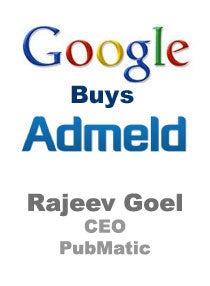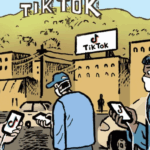 In an interview with AdExchanger.com, sell-side platform CEO Rajeev Goel of PubMatic offered his views on Monday’s acquisition of its competitor Admeld by Google. Read full coverage of the acquisition here.
In an interview with AdExchanger.com, sell-side platform CEO Rajeev Goel of PubMatic offered his views on Monday’s acquisition of its competitor Admeld by Google. Read full coverage of the acquisition here.
AdExchanger.com: Generally speaking, what is your view on the impact of the acquisition on the ad ecosystem, and publishers specifically?
RAJEEV GOEL: An acquisition of this magnitude reaffirms the strength of the online advertising industry and, more specifically, the need for publisher-focused innovation. This deal speaks to the importance and value of publisher-focused solutions. This is clear if we look at the magnitude of exits on the demand side of the ecosystem, for example, which have been much smaller.
Over the past several years, PubMatic has evolved from a technology centric ad network optimizer into a full Sell Side Platform (SSP), where the service and expert guidance we offer has become as important as our technical solutions. Our success over the past few has been built upon gaining the publisher’s trust. Publishers need a technology and service layer that works on their behalf to help them maximize their revenue and manage their brands online.
From what I’m hearing in the market and my first hand discussions with publishers, there is much more fear than excitement. Many publishers chose to work with Admeld or us not only because of superior technology and service, but also because we were not Google, we were independent. That has changed.
Google owns not only a DSP but also an ad server, an ad exchange, an ad network, and now an SSP. In addition, they are one of the largest media companies in the world with YouTube, Gmail, Maps, and a myriad of publishing properties.
Their vision, as I understand it, is to create an end-to-end monetization pipe for display advertising. They are doing this under the mantra of simplifying display for publishers and advertisers. However, if there’s one thing we know about Google from their success in search, it’s that the benefits of that approach are going to disproportionately flow to Google. There’s no vibrant ecosystem around search. Few publishers make money from search. There’s a reason why the LUMAscape for Display has 10 times as many logos as the LUMAscape for Search.
That’s why I have had a half-dozen major Admeld customers give me a call since the news broke on Thursday. There is palpable fear out there and smart publishers know that Google’s idea of simplification may just simplify the publisher out of business.
Like hundreds of other intelligent, innovative companies out there, PubMatic is working hard to preserve the success and viability of the ecosystem.
Is this good or bad news for PubMatic?
I see this development as very positive for PubMatic for a variety of reasons.
We are the only major Sell Side Platform that is 100% customer focused and is not distracted by an integration or regulatory process. Google/Admeld is going to face an extremely lengthy regulatory review and integration timeline. DoubleClick took nearly a year of antitrust review; AdMob took 6 months of antitrust review; ITA took over a year. Admeld will easily take several quarters. After that, the real work of integration begins.
In contrast, we have nearly doubled our development team since the beginning of this year to almost 100 people focused on developing publisher solutions, while our services team continues to grow at a very rapid pace. We are 100% focused on the customer day-in and day-out. Ultimately customers will decide who takes their interests to heart. We ship new features several times per week. And let’s not forgot who is generally pushing the industry forward – innovative startups.
Second, the transaction price sends a clear signal to the market for the value of display technology, particularly publisher-focused display technology. There is a real premium being paid here for access to premium publisher inventory at scale.
Third, any major player in the display advertising ecosystem that has a content-focused strategy is going to require a strategy and platform that allows for programmatic management and selling of that inventory. That’s a reality of the supply and demand dynamics of the industry. This deal points to the importance of the SSP capability set in really driving monetization and control for that inventory. Historically the focus for SSPs has been on the lowest value inventory – unsold or remnant. In the last year, however, the focus has shifted to premium inventory via new solutions such as private marketplaces , giving complete control back to the publisher. As a result, the value that we can bring as an SSP to these players will only increase by several multiples. And all of this improvement drops straight to the publisher’s bottom line.
Most importantly, we are the only independent SSP being considered by big publishers that has no inherent conflict of interest, and that stands clearly for all publishes to see.
In sum, it’s a great time for PubMatic, and we’re more motivated than ever to show publishers why we’re their best partner.
Private exchanges/Private Marketplaces for large publishers have been an important part of AdMeld’s strategy. How does PubMatic approach it?
PubMatic’s Private Marketplaces provide the transparency and control layers that publishers have been lacking for several years. What makes Private Marketplaces unique is the ability for publishers to sell RTB campaigns through their direct sales force. This is all about publishers retaking control of their ad space and selling on their terms. And in that respect, how can Google/Admeld possibly pretend that there are no conflicts of interest between Google’s direct sales force (which is massive) and that of the publisher’s? Google will be sitting in the lobby of the exact same brand or agency, trying to out-muscle the publisher’s sales force, so that Google can capture the same campaign dollar. This flies in the face of the control that Private Marketplaces are intended to deliver to the publisher.
PubMatic’s approach to Private Marketplaces will remain the same as it has been for the better part of a year – consult with our publisher clients to see if Private Marketplaces are right for them. After careful consideration they can decide if they want to sell RTB campaigns completely on their own, partially on their own, or if they want PubMatic to continue to manage all aspects of their RTB campaigns. And if they are ready to sell RTB campaigns on their own, we will give them expert guidance – without conflict.
By John Ebbert












